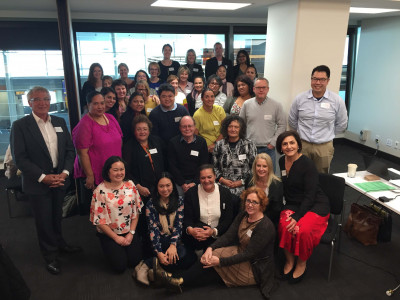 Nine teams from the 2019 Whakakotahi cohort gathered for the first time in Wellington on Tuesday 14 May 2019. This was an opportunity for many of the teams to network with each other, share where they are with their projects and learn from the presentations and guest speakers.
Nine teams from the 2019 Whakakotahi cohort gathered for the first time in Wellington on Tuesday 14 May 2019. This was an opportunity for many of the teams to network with each other, share where they are with their projects and learn from the presentations and guest speakers.
Equity and consumer co-design were key themes of the day. The first workshop was facilitated by Adele Small from Te Tihi and Sandy Bhawan from PHARMAC. Their session explored equity – what it is, how it might affect practice and how it might be measured in their projects. Teams were encouraged to think about what inequities might exist in their practice and how these could be addressed. Different models of understanding health care from Māori and Pacific perspectives were also discussed.
Jane Cullen, quality improvement advisor at the Health Quality & Safety Commission, presented on measuring improvement – the importance of knowing what your baseline is, measuring improvement and change, and how this can be used to examine any gaps in equity and close them. The teams were able to plot run charts and identify what the chart might or might not show.
The teams also had an opportunity to learn from other groups that had participated in previous Whakakotahi cohorts. Gonville Health presented their 2018 Whakakotahi project (improving the patient enrolment process to decrease the average time to first appointment, improve the patient experience and reduce pressure on staff). Gonville Health service manager, Janine Rider, spoke of initially feeling overwhelmed when first starting out, but encouraged the 2019 teams to keep working hard. 'It all came together in the end and was a great journey of discovery, learning and building their capability in applying quality improvement methods,' said Janine.
Phillipstown Community Pharmacy in Christchurch presented their successful consumer co-design smoking cessation project. They demonstrated their work and the impact of consumer co-design to achieve high impact results in complex areas that may be resistant to change.
Each of the 2019 teams then presented their work so far, taking the opportunity to share how far they have come since beginning their projects, and outlining some of their challenges and successes. This was a great opportunity for the teams to see similarities between their projects, share with and learn from one another. The teams finished the day with a group exercise exploring the ‘Plan, Do, Study, Act’ (PDSA) process.
Participants left feeling energised, as they continue with their projects. A snapshot of the 2019 projects can be found on the Whakakotahi 2019 web page.
On-site and remote support continues to be provided by the Commission in between learning events, and the participants are looking forward to coming together again at the second learning session scheduled for October 2019 in Auckland.
You can view a selection of the team’s presentations:
- South City Health eczema project (593KB, PDF)
- Taumarunui Community Kokiri Trust he mate huka oranga (380KB, PDF)
- Reducing hospitalisation rates for eczema-related cellulitis admissions of children aged 0–4-years and enrolled with Hauora Heretaunga general practice (274KB, PDF)
- Lack of timely and safe access to medicines at the Te Whānauā Apanui Community Health Centre (2.7MB, PDF)
- Diabetics on maximum oral doses resistant to insulin initiation need to commence insulin uptake (704KB, PDF)
- A consumer-centred approach to improving patients’ diabetes control (1.1MB, PDF)
- Improving access to health care for patients on opioid substitution treatment at Victory Square Pharmacy (2MB, PDF)
- Improving quality of life in Māori patients with poorly managed gout registered at Hora te Pai health centre in the Kāpiti Coast (596KB, PDF)
